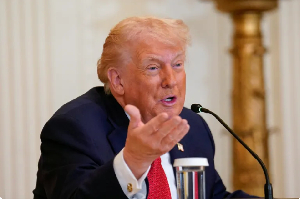The Bank of Ghana (BoG) should further raise banks’ minimum capital requirements to “contain vulnerabilities” in the industry, the International Monetary Fund (IMF) said on Tuesday.
While it praised the rapid growth and competition in the banking industry, the IMF also worried that high domestic interest rates -- driven by excessive government borrowing -- could curtail the economy’s growth momentum.
Following regular consultations with authorities in Ghana, directors of the Fund’s Executive Board “recommended higher minimum capital buffers to contain vulnerabilities, including the risk of increasing nonperforming loans,” the Washington-based institution said in a statement.
An analysis by the B&FT of all but two banks in the industry showed that a 25 percent boost to current minimum capital requirements would mean 12 of the players must inject combined additional capital of almost GH¢140million into their operations.
In December, the BoG concluded the second stage of the industry’s recapitalisation, which raised the minimum capital from GH¢25million to GH¢60million.
The IMF also reiterated its call on the BoG to divest its financial stake in the banking sector and resolve as yet unnamed weak banks in the sector. One of the supposed “weak banks” is believed to be Merchant Bank Ghana Limited, whose 2012 financial statements have been conspicuously missing from the public record -- including data available to the main industry lobby, the Ghana Association of Bankers.
The BoG is currently considering a bid to take over the bank by FirstRand Bank of South Africa, the second-biggest lender by market value in Africa’s economic powerhouse.
Though it has commended the Central Bank’s ongoing efforts to improve the banking system, the IMF has insisted that the BoG’s role as a shareholder and a regulator creates a conflict of interest and undermines its supervision of the industry.
The BoG owns 48 percent of the Agricultural Development Bank and has a stake in the National Investment Bank as well. Though the BoG has created a trust to manage its portfolio, it still does not address the conflict of interest, according to the IMF.
The Fund’s statement pointed out that while the economy’s growth momentum has continued into 2013, non-oil growth -- which was 7.8 percent last year -- is likely to decelerate due to energy disruptions and high real interest rates.
The high interest rates, which were initially engineered by the BoG to arrest the free-fall of the cedi in the first half of 2012, have been sustained in 2013 by the re-emergence of a large fiscal deficit and rising public debt.
“Directors underscored the need for decisive action to rebuild fiscal and external buffers and reduce public debt, and in particular stressed the importance of regaining control over the public wage bill,” the statement said.
Minister of Finance Seth Terkper said in March that the budget deficit of 12.1 percent of GDP in 2012 will be shrunk to 9 percent of GDP in 2013 and 6 percent of GDP by 2015. The IMF, however, saw the projection being weighed on by higher spending on fuel subsidies, and forecast a gap of 10 percent of GDP.
Government has meanwhile indicated its intention to cut electricity and water subsidies among a raft of actions, including higher taxes, which are necessary to secure the fiscal targets.
The IMF also urged the Central Bank to maintain tight monetary policies “until inflationary pressures subside and fiscal consolidation is firmly established”.
Inflation surged from 8.8 percent at the start of the year to 10.9 percent in May following the removal of petroleum subsidies within the period. The BoG has said inflationary pressures remain elevated due to the anticipated increase in utility prices.
Part of the Fund’s commentary commended the great strides Ghana has made in reducing poverty and reaching lower middle-income status, adding that “directors saw strong potential for sustained and inclusive growth, provided current macroeconomic vulnerabilities are addressed decisively”.
Business News of Friday, 21 June 2013
Source: B&FT












